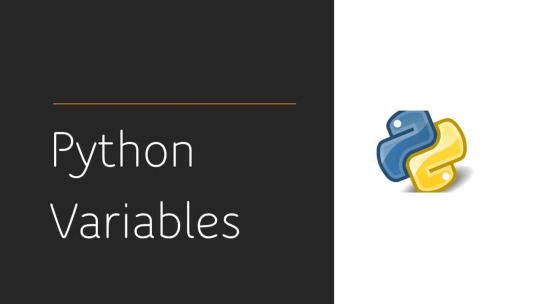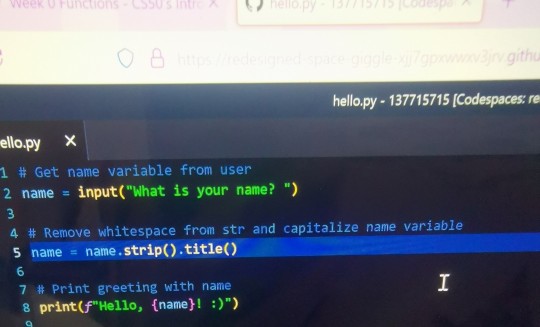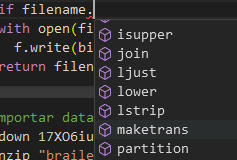#Python variables
Explore tagged Tumblr posts
Text
Mastering Python Variables: A Beginner’s Guide
Discover the basics of Python variables, how to create and use them effectively, and understand their role in storing and managing data in your programs. Perfect for beginners in Python programming.
0 notes
Text
Getting Started with Python: A Beginner's Guide (pt 2)
They say teaching is the best way to learn. Consider subscribing to the website!
Expanding Your Knowledge: Collections and Control Flow In Part 1 of our beginner’s guide to Python, we covered the basics of variables, data types, and conditional statements. Now, let’s dive deeper into collections like lists, tuples, and dictionaries, as well as control flow mechanisms such as loops and functions. Lists: More Than Just Arrays As mentioned earlier, a list is a collection of…
#Beginner#Coding#Dictionaries#Functions#Getting started with Python#Introduction to Python programming#Learn Python#Lists#Loops#Programming#Python#Python basics#Python conditional statements#Python control structures#Python data types#Python for beginners#Python operators#Python variables#Tuples
0 notes
Text
Python Variables
Python Variables Hello Friends. In my last post, we discussed about String manipulation using python functions. In this post I will talk about the concept of python variables. In Python, variables are used to store data values. They are like containers that hold information which can be referenced and manipulated throughout the program. Variables in Python are dynamically typed, meaning you…

View On WordPress
0 notes
Text
Day-1: Demystifying Python Variables: A Comprehensive Guide for Data Management
Python Boot Camp Series 2023.
Python is a powerful and versatile programming language used for a wide range of applications. One of the fundamental concepts in Python, and in programming in general, is working with variables. In this article, we will explore what variables are, how to use them effectively to manage data, and some best practices for their usage. What are Variables in Python? Definition of Variables In…

View On WordPress
#best practices for variables#data management in Python#dynamic typing#Python beginners guide#Python coding tips#Python data manipulation#Python data types#Python programming#Python programming concepts#Python tutorials#Python variable naming rules#Python variables#variable scope#working with variables
0 notes
Text
#THERES A FUCKING TYPO IN THE TITLE FUCK ME#yeah yeah i know theres a space in the quotes its just to emphasize that there's nothing between them#danblab#i probably left a ton out this is just based on bash and python variables off the top of my head though
21 notes
·
View notes
Text
speaking as a previous learner of C, THIS IS THE ONE MOST BEAUTIFUL THING I'VE EVER SEEN

#you can!! chain functions!! on a string!! and it works!! it doesn't throw a tantrum!! it's ok with it!! it loves you!!#python is my beautiful sister and i am playing around with all of her functions in an open field#🌙rambling#no id#🌙codeposting#//edit: YOU CAN JUST DO IT ALL ON THE SAME LINE YOU FIRST GET THE VARIABLE!!!?!#is it ok if i die on your carpet
7 notes
·
View notes
Text
not me struggling to figure out the for command in python :3
48 notes
·
View notes
Text
python save me. save me python
#cannot get this fucking lab work to compile so im just gonna focus on my python assignment#because its easy as shit#(although tbf thats almost definitely just because i dont have to modularise or anything)#literally just basic printing and inputting user variables vs using data structures and opening and closing files and pointers and arrays a#afhhhhh#me.txt#maybe ill just take the l on this lab#i can take it. probably
9 notes
·
View notes
Text
Man why is working with web apps so obnoxious. "422 unprocessable entity teehee. Good luck figuring out which entity it is, much less why I refuse to process it"
#i almost went apeshit when fastapi refused to take a numpy int because it WOULDN'T TELL ME WHICH VARIABLE WAS THE PROBLEM#luckily i realized i could put a breakpoint right into my python code before i went entirely off the deep end#programming
10 notes
·
View notes
Text
WORDS cannot DESCRIBE how much i hate coding
#AGONIZING#HOURS AND HOURS AND YOU KNOW WHAT MY PROBLEM WAS????#I WAS USING THE WRONG FUCKING DATASET. OOPSIE DAISY I NEEDED DATA2 NOT DATA1#KILLING MYSELF#NOT THE PROFESSORS FAULT BUT ALSO KIND OF HIS FAULT WHYYYYYY ARE YOU TRYING TO TEACH US PYTHON WITH COMPLEX MATH#WE ARE TRYING TO LEARN THE C O D E PORTION. KEEP THE MATH SIMPLE UNTIL WE UNDERSTAND THE FUCKING CODE#YA KNOW. THAT PART THAT WERE ACTUALLY TRYING TO LEARN#IF I DONT UNDERSTAND THIS FUCKING EQUATION IT JUST MAKES IT ALL MORE MEANINGLESS#I NEED TO KNOW WHAT MY VARIABLES MEAN TO KNOW WHATS WRONG WITH THEM#THIS NEVER WOULD HAVE HAPPENED IF I COULD TELL AT A GLANCE THAT MY EQUATIONS W E R E N T THE PROBLEM#SOMEBODY GIVE ME SOMETHING BREAKABLE
2 notes
·
View notes
Text
Getting Started with Python: A Beginner's Guide (pt 1)
I was inspired to pursue mastery or expertise in the tech field like coding and development, and to do so there must be a foundation. Here is my beginning.. - I welcome the conversation.
Understanding Variables I was inspired to pursue expertise in the tech field, like coding and development. To achieve this, there must be a foundation. Here is my beginning. I welcome the conversation. In Python, a variable is a container for storing a value. You can assign a value to a variable using the “=” operator. The value can be of any data type, such as a string, integer, or…
#Getting started with Python#Introduction to Python programming#Learn Python#Python basics#Python conditional statements#Python control structures#Python data types#Python for beginners#Python operators#Python variables
0 notes
Text
if, else, if not, and why is my code telling me I didn't define my name when it's very clearly defined?
Hi there, my second insight for you is actually related to coding proper this time, but for some reason, I didn't figure it out right away.
If you're like me, your game relies heavily on conditions being met to move forward. With me, my game is in three parts that can be interchanged, with some impact on how the story goes depending on where you went first. Unfortunately that means that from the game's point of view, you didn't define your conditions, since they weren't met yet.
So my advice to you is to not define your conditions the way the tutorial teaches you to, because coding an entire game is a lot more complex than coding a single scene, and while their method works for a tutorial piece, it doesn't work for a full project.
If you want to have variables later in game, define them immediately.
Now, that's where things get a lil bit complex: you need to figure out whether to default or define your variables.
The difference: "default", as the name suggests will assign a default value, and will be changed and saved in the save file, while define won't change. It's consistant, and resets every time you relaunch the game.
Here's a define example:

Now here's a default example:

7 notes
·
View notes
Text
holy shit python allows me to turn string variables trans

#qrevo.txt#python being based. as always#there are chemicals in the functions turning all the variables trans#i'm soo sleepy idk how i'm still powering through this project
3 notes
·
View notes
Text
The straightest man you know has every object type in his code editor set to a different color of the rainbow.
#this is me but im also probably not the straightest man that most of you know#danblab#its funny though - i set like every single variable type as a different color but i dont even remember what they all mean#im pretty sure if anybody else tried to read python in my VS code theyd puke
2 notes
·
View notes
Text
Me deleting most of the code scripts I wrote for school as part of assignments
Months later
“I did this before in a funny or efficient way. Where is that code so I can copy it? Oh wait…”
deleting files makes me so scared what if i Needed That
#computer science#python#I once wrote 1-200 line code where every variable was a pun/random word that only made sense to me#I also would write variables in multiple languages so I could be more understandable with the names#my teacher told me to stop#I made so much cursed code#it’s all gone now#:((
74K notes
·
View notes
Text
youtube
0 notes